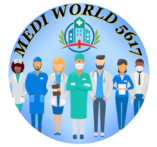TYPES OF EMERGENCY DOCTOR

Emergency departments (EDs) are staffed by a variety of doctors with specialized training to handle acute and life-threatening medical situations. These professionals come from diverse fields to provide comprehensive emergency care. Below are the primary types of doctors who work in emergency departments:
1. Emergency Medicine Specialists
- Role: Core providers in the emergency department.
- Training: Trained in handling all types of medical emergencies, from trauma to cardiac events.
- Responsibilities:
- Rapid assessment and stabilization of critically ill patients.
- Coordinating care and prioritizing interventions.
- Deciding whether to admit, transfer, or discharge patients.
2. Trauma Surgeons
- Role: Specialize in surgical care for critically injured patients.
- Training: General surgery residency with a fellowship in trauma and critical care.
- Responsibilities:
- Managing major trauma cases like road accidents, gunshot wounds, and stab injuries.
- Performing life-saving surgeries in emergency situations.
3. Cardiologists
- Role: Called for emergencies involving heart-related issues.
- Responsibilities:
- Treating acute coronary syndromes like heart attacks.
- Managing arrhythmias or heart failure in critically ill patients.
- Performing emergency procedures like angioplasty.
4. Neurologists
- Role: Handle neurological emergencies.
- Responsibilities:
- Diagnosing and managing stroke, seizures, or head injuries.
- Initiating treatments like thrombolysis for stroke patients.
5. Pediatric Emergency Doctors
- Role: Experts in treating children in emergency settings.
- Training: Pediatric specialization with additional training in emergency care.
- Responsibilities:
- Managing acute illnesses and injuries in infants, children, and adolescents.
- Providing age-appropriate care for young patients.
6. Anesthesiologists/Critical Care Doctors
- Role: Manage airway and provide sedation or pain relief in critical scenarios.
- Responsibilities:
- Performing intubations and managing ventilators.
- Overseeing patients in critical condition requiring life support.
7. Orthopedic Surgeons
- Role: Called for emergencies involving musculoskeletal injuries.
- Responsibilities:
- Treating fractures, dislocations, and severe soft tissue injuries.
- Providing stabilization and planning surgical interventions.
8. Obstetricians/Gynecologists (OB/GYNs)
- Role: Handle emergencies related to pregnancy and childbirth.
- Responsibilities:
- Managing obstetric emergencies like ectopic pregnancies or complications during delivery.
- Providing care for gynecological emergencies like hemorrhage or ovarian torsion.
9. General Surgeons
- Role: Address a variety of surgical emergencies.
- Responsibilities:
- Treating conditions like appendicitis, intestinal obstructions, or perforated ulcers.
- Performing emergency abdominal surgeries.
10. Psychiatric Emergency Doctors
- Role: Manage acute mental health crises.
- Responsibilities:
- Treating patients with suicidal ideation, severe depression, or psychosis.
- Stabilizing and referring patients for further psychiatric care.
11. Infectious Disease Specialists
- Role: Consulted for complex infection-related emergencies.
- Responsibilities:
- Managing sepsis, meningitis, or tropical diseases.
- Advising on antimicrobial therapy for critically ill patients.
12. ENT Surgeons
- Role: Handle emergencies related to the ear, nose, and throat.
- Responsibilities:
- Managing airway obstructions or foreign body removal.
- Treating severe infections like peritonsillar abscesses.
13. Ophthalmologists
- Role: Address eye-related emergencies.
- Responsibilities:
- Treating trauma to the eye, retinal detachments, or acute glaucoma.
- Performing emergency surgical interventions when necessary.
14. Radiologists
- Role: Provide diagnostic support in emergencies.
- Responsibilities:
- Interpreting imaging studies like CT scans, MRIs, and X-rays.
- Assisting with interventional radiology procedures, such as embolization.
15. Toxicologists
- Role: Manage poisoning and drug overdose cases.
- Responsibilities:
- Providing specific antidotes and treatments for toxic exposures.
- Collaborating with emergency medicine teams in complex cases.
Key Team Approach
Emergency departments thrive on teamwork, with doctors from various specialties collaborating to provide the best possible care. Depending on the nature of the emergency, a multidisciplinary approach may involve several specialists working together.
